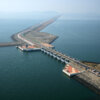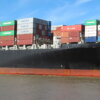The dredging industry is a high tech, innovative maritime profession, comprised of a well-educated workforce of scientists, engineers and trained crews. It includes large, medium and small dredging companies, supported by shipbuilders and other equipment and technology suppliers.
Local, regional, national or international
Dredging contractors may be local, regional, national or international companies. They may be privately owned corporations, family-owned enterprises or government-owned organisations or a combination of these.
Smaller, more straightforward projects are often carried out by local and regional contractors with very specific types of equipment suited to their regions.
Large projects, such as land reclamation, canal and port development, and offshore energy projects, usually involve the major international contractors, from Europe and Asia, which have large and varied vessels and state-of-the-art equipment, which give them better capacity to tackle these challenges. Almost all large maritime infrastructure contracts, which are most often proposed by government and port authorities, require competitive bidding through strictly regulated tenders.
Innovations
Innovations in dredging vessels and other equipment are a prerequisite for an industry that is highly specialised. Attention to environment is part of every project and pre-, adaptive and post-monitoring have become industry standards.
Safety
The dredging industry is also guided by national and international safety regulations. Safety standards in the major international companies are constantly scrutinised to ensure a reduction in incidents and accidents.
Mega-projects
Very large jobs, sometimes called “mega-projects”, may demand that major contractors join forces in consortia or joint ventures in order to supply adequate dredging vessels and auxiliary equipment. Since dredging equipment involves expensive capital investment, specially trained operators and logistical support, as well as experienced project managers, are crucial.
Private vs public companies
Government-owned and -operated dredging fleets still exist in many maritime nations, although the support of the private dredging industry is often enlisted as well. More and more for major dredging works, dredging companies are operating as the main contractors and are responsible for hiring subcontractors to carry out specific parts of the total construction. Today’s dredging industry is an indispensable component of all major maritime infrastructure projects.
TAGS
related
Articles
Estimating sediment erosion of a centrifugal dredge pump’s impeller

Sediment erosion is a phenomenon of mechanical wear of components that decreases efficiency and uptime of the dredging process. Dredge pumps are designed to handle mixtures of water and solid particles with varying particle size from less than 0.002 mm to greater than 200 mm. A dredge pump’s overall effectivity in the field depends upon its uptime. Uptime is influenced by the number of times the pumping process is interrupted, which can be due to maintenance combating the material loss, clogging, etc. This research deals with the erosion phenomena by considering a framework of numerical models, capable of qualitative and quantitative erosion estimation, coupled with experiments for validation. Coordinate Measurement Machine (CMM) is used for surface roughness measurement before and after the experiment, thus depicting the material loss due to erosion.
Submissions for IADC’s Safety Awards 2022

When individual employees, teams and companies view everyday processes and situations through a continuous lens of safety, they can each contribute to making all aspects of operational processes, whether on water or land, safer. For the 2022 Safety Awards, IADC’s Safety Committee received 11 submissions. Each one is assessed on five different categories; sustainability; level of impact on the industry; simplicity in use; effectiveness; and level of innovation.
Building a proactive safety culture within a marine contractor organisation

It is hard to imagine a time when safety was not deemed important, when Personal Protective Equipment (PPE) was not used and little was done in the way of prevention. A few decades ago, occupational health and safety was not considered as important for the vast majority of companies. Instead, incidents and emergencies were handled as they occurred, as effectively as possible given the limited technology and resources available. Today, those times have changed. This article explores the progress of health and safety in the dredging industry and QHSSE professionals, Ton van de Minkelis and Christophe Leroy share their experiences in building a proactive safety culture.
Young Author Award winners: Where are they now?

Each year, at selected conferences, the Conference Paper Committee is asked to recommend a prize winner whose paper makes a significant contribution to the literature on dredging and related fields. Since 1987, IADC has presented 42 Young Author Awards. Curious to see where they are now, we asked previous winners what impact winning the award had on them and their career.
Shaping the engineers of tomorrow

During his distinguished career as professor of Coastal Engineering at Delft University of Technology (TU Delft), Kees d’Angremond served as head of Hydraulic and Offshore Engineering, chair of the department of Hydraulic and Geotechnical Engineering, and dean of the faculty of Civil Engineering from 1989 to 2001. Now professor emeritus, he still works as an advisor and independent consultant. We invited Kees to a conversation with Stefan Aarninkhof, professor of Coastal Engineering and chair of the department of Hydraulic Engineering at TU Delft, to talk about their careers in the dredging industry and the role of academia in the industry today.
Finding innovative solutions to improve safety

When individual employees, teams and companies view everyday processes and situations through a continuous lens of safety, they can each contribute to making all aspects of operational processes, whether on water or land, safer. For the 2021 Safety Awards, IADC's Safety Committee received 15 submissions. Each one is assessed on five different categories; sustainability; level of impact on the industry; simplicity in use; effectiveness; and level of innovation.
Interview: Stéphanie Groen, Director of Coastal & Climate Change in Asia for Aurecon in Singapore

Stéphanie Groen works as the Director of Coastal & Climate Change, Asia for Aurecon. Based in Singapore, she was appointed to the position at the beginning of 2020. Previously, Stéphanie was involved in marine and environmental projects for more than 15 years with DHI and her education is in civil engineering and business administration. IADC also knows Stéphanie as the winner of the Young Author Award in 2007. More recently, she was appointed as a committee member to the prestigious FIDIC Sustainable Development Committee. We were interested to hear more from Stéphanie – her views on sustainability, the collaboration with the dredging industry through FIDIC and what her new role can mean for sustainable water infrastructure projects.
Interview – CEO of DEME Group, Luc Vandenbulcke

‘What will “sustainability” be in ten years? Our industry needs to be prepared for that.’ Luc Vandenbulcke kicked off 2019 in his new role as CEO of DEME Group. After 21 years working within the group, with 14 of those years starting up, leading and growing the group’s offshore subsidiary, he is now heading the company’s future as it navigates the evolving processes of sustainability.
Publications
Dredging for Development

A clear non-technical introduction to the complex field of dredging, published in co-operation with the International Association of Ports & Harbors.
Seminars & Courses
Videos
‘The larger forces behind the drivers of change’ presentation by Julius Senn (London School of Economics Enterprise)

Julius Sen is Associate Director and Senior Programme Adviser at the London School of Economics Enterprise. His areas of responsibility include project design and delivery of executive education and consultancy programmes relating to economic and trade policy issues especially as they relate to globalisat
















